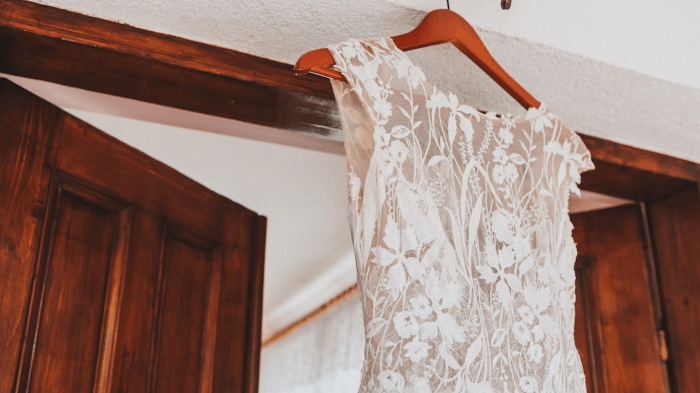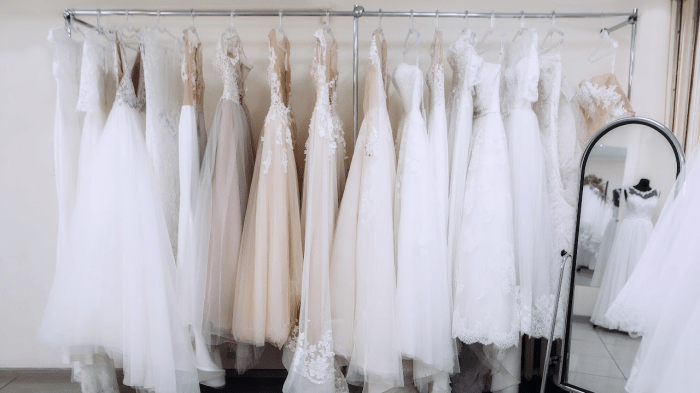The Rise of Resale Wedding Dress Sites
Resale wedding dress sites – The online resale market for wedding dresses has experienced significant growth in recent years, offering brides a sustainable and budget-friendly alternative to purchasing brand-new gowns. This trend reflects a broader shift towards conscious consumerism and a desire for unique, pre-owned items. This article delves into the various aspects of this burgeoning industry, exploring its popularity, business models, pricing strategies, user experience, legal considerations, marketing approaches, and future prospects.
Popularity and Trends of Resale Wedding Dress Sites

Source: surferseo.art
The online resale wedding dress market has witnessed substantial expansion over the past five years. While precise statistics are difficult to pinpoint due to the fragmented nature of the market, anecdotal evidence and reports from major players suggest a significant increase in both the number of websites and transactions. Factors like increased awareness of sustainability, the desire for unique dresses, and economic considerations have fueled this growth.
Three key factors driving the popularity of these sites include:
- Sustainability: The environmental impact of fast fashion is increasingly recognized, leading brides to seek more eco-friendly options. Reselling dresses reduces textile waste and promotes a circular economy.
- Affordability: Wedding dresses can be expensive. Resale sites offer significant cost savings, making dream dresses accessible to a wider range of brides.
- Uniqueness: Many brides desire a unique look, and resale sites offer a wider variety of styles and designers than traditional bridal shops, often at a fraction of the original price.
A comparison of demographics between resale buyers and new dress buyers reveals some interesting differences:
| Demographic | Resale Buyers | New Dress Buyers |
|---|---|---|
| Age | Broader range, including older brides and those remarrying | Concentrated in the younger age bracket (25-35) |
| Budget | More budget-conscious, seeking value for money | Less constrained by budget, prioritizing brand and style |
| Wedding Style | More diverse range of styles, including vintage and alternative aesthetics | May lean towards current trends and popular designers |
Types of Resale Wedding Dress Sites and Their Business Models
Resale wedding dress websites can be categorized into several types, each with its own business model and implications for buyers and sellers.
Resale wedding dress sites offer a fantastic way to find your dream gown at a fraction of the original cost. If you’re looking for something truly special, consider the stunning options available, such as plus size corset wedding dresses , which often appear on these sites. Remember to check carefully for condition and sizing before purchasing from any resale platform, ensuring a perfect fit and a memorable wedding day.
- Peer-to-Peer Marketplaces: These platforms connect individual sellers directly with buyers, acting as an intermediary for transactions.
- Consignment Shops: These sites act as a middleman, taking possession of the dresses and selling them on behalf of the seller, usually for a commission.
- Curated Marketplaces: These platforms select and showcase dresses from sellers, often focusing on specific styles, designers, or price points. They usually employ stricter quality control measures.
The revenue models employed by each category vary:
- Peer-to-Peer: Transaction fees (percentage of sale price).
- Consignment Shops: Commission on successful sales.
- Curated Marketplaces: Commission on sales, plus potential subscription fees for sellers (for enhanced listings or features).
A comparison of the advantages and disadvantages for each business model:
| Business Model | Buyer Advantages | Buyer Disadvantages | Seller Advantages | Seller Disadvantages |
|---|---|---|---|---|
| Peer-to-Peer | Often lower prices, direct communication with seller | Higher risk of scams, less buyer protection | Higher profit margin, direct control over pricing and presentation | More responsibility for managing sales and shipping |
| Consignment | Convenience, professional handling of sales, potentially higher quality assurance | Higher prices compared to peer-to-peer, less selection | Less work involved in selling, professional handling of transactions | Lower profit margin due to commission |
| Curated Marketplace | High-quality dresses, curated selection, trusted platform | Higher prices, limited selection based on curation | Enhanced visibility, professional presentation, marketing support | Stricter requirements, lower profit margin due to commission |
Pricing Strategies and Factors Affecting Dress Value on Resale Sites
Several factors influence the pricing of used wedding dresses, including brand, condition, style, age, and alterations. High-end designer dresses in excellent condition will generally command higher prices than less-known brands or dresses with significant wear and tear. Pricing strategies vary across platforms, with some focusing on competitive pricing while others emphasize premium listings. To optimize price and sales, sellers should:
- Thoroughly clean and professionally photograph the dress: High-quality images are crucial for attracting buyers.
- Accurately describe the dress’s condition, including any alterations or imperfections: Transparency builds trust.
- Research comparable listings: Determine a fair price based on similar dresses sold on the platform.
- Consider offering reasonable negotiation: This can attract buyers and speed up the sale process.
- Utilize the platform’s features: Leverage any marketing tools or promotional opportunities offered by the site.
The User Experience on Resale Wedding Dress Sites
Evaluating the UI/UX of popular resale wedding dress sites reveals a range of approaches. Sites like Stillwhite are known for their clean, user-friendly interface and robust search filters. Others may lack intuitive navigation or comprehensive search functionalities. Best practices include clear product photography, detailed descriptions, secure payment gateways, and responsive customer support. A typical buyer’s journey might involve:
- Search and Filtering: Browsing by style, size, designer, or price range. Pain points include limited filter options or slow search results.
- Product Discovery: Viewing detailed product listings, including images, descriptions, and seller information. Pain points include insufficient images, vague descriptions, or lack of seller ratings.
- Communication with Seller: Asking questions about the dress’s condition, measurements, or shipping. Pain points include unresponsive sellers or difficulty in initiating contact.
- Purchase and Payment: Completing the transaction through a secure payment gateway. Pain points include complicated checkout processes or lack of buyer protection.
- Shipping and Delivery: Tracking the shipment and receiving the dress. Pain points include lengthy shipping times or damaged goods.
Legal and Ethical Considerations for Resale Wedding Dress Sites
Selling used wedding dresses online involves legal considerations, including contracts (governing sales agreements), liability (for damaged or misrepresented goods), and intellectual property (regarding designer brands). Ethical considerations include accurate descriptions, fair pricing, and responsible returns. Best practices involve clear communication, comprehensive return policies, and a transparent dispute resolution process.
Marketing and Promotion of Resale Wedding Dress Sites
Successful resale wedding dress sites employ a multi-channel marketing strategy, leveraging social media, search engine optimization (), influencer marketing, and email marketing to reach their target audience of brides. Effective campaigns often highlight the value proposition of sustainability, affordability, and uniqueness. A hypothetical marketing plan might include:
- Target Audience: Budget-conscious brides, eco-conscious brides, brides seeking unique or vintage styles.
- Channels: Social media (Instagram, Pinterest, Facebook), , paid advertising (Google Ads), influencer collaborations, email marketing.
- Messaging: Emphasize sustainability, affordability, and the opportunity to find a unique dream dress.
The Future of Resale Wedding Dress Sites

Source: surferseo.art
The future of resale wedding dress sites is promising. Technological advancements, such as virtual try-ons and augmented reality (AR) applications, will enhance the online shopping experience, making it easier for brides to visualize how a dress will look on them. Opportunities for innovation include personalized styling recommendations, integrated alterations services, and enhanced authenticity verification mechanisms. The growing awareness of sustainability and the continued popularity of online shopping will likely fuel further growth in this sector.
General Inquiries: Resale Wedding Dress Sites
How can I ensure the dress I buy is authentic?
Look for reputable sites with verification processes. Check seller reviews and request additional photos or videos. Consider purchasing from established brands or retailers.
What are the typical return policies on resale wedding dress sites?
Return policies vary widely. Always check the site’s policy before purchasing. Many sites offer limited or no returns, especially on final sale items.
How long does it typically take to sell a dress on a resale site?
The selling time depends on factors like dress condition, brand, price, and season. It can range from a few weeks to several months.
What fees are involved in selling a dress on a resale site?
Sites typically charge a commission on the sale price, or a listing fee. Some may charge both. Review the site’s fee structure before listing your dress.


